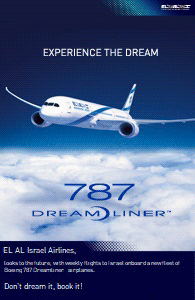| From F-16s to Boeings EL AL chief sees only blue skies ahead |

|

|
|
Elyezer Shkedy, President and CEO of EL AL Israel Airlines joined the airline in January 2010 after a distinguished career of nearly 33 years in the Israeli Air Force, earning the rank of Major General.
Shkedy was visiting Hong Kong in June, Jewish Times Asia sat down with EL AL's president to discuss the airlines position in Asia and his personal experiences as a fighter pilot. Jewish Times Asia: What is the situation regarding Asia in the development plans of EL AL? We are trying to put Asia more clearly on our map. We fly into four places in Asia: Hong Kong, Mumbai, Bangkok, and Beijing. We are trying to increase flight frequency. Lately, a year ago, I decided to make a change and we enlarged the capacity into Asia and added flights into Hong Kong, Mumbai and Beijing and that was quite a dramatic change. It is complicated to get ‘slots’, especially in Beijing. One slot we got into Beijing was not attractive so we did not take it. We know what we want and that slot did not fit our requirements. The capacity in 2011 became much bigger than before. I am thinking fiercely about the next step for Asia. One thing is to further increase the frequency and capacity to the same places, or, whether to open new routes and it’s not a simple decision. I see that within 2 to 3 years we will have even more capacity and more routes. Then again, should we open the new routes in the same countries or open new countries? The second issue is, developing our ability to reach beyond our extant places, with code shares (where a partner or EL AL can sell a ticket all the way to say Australia despite that EL AL does not fly to Australia, and vice versa, for our partners where EL AL flights are included in their schedules. We see us flying all around Asia with partners. Jewish Times Asia: Will there be deals such as with Hong Kong's Cathay Pacific? We always think from the commercial point of view. Other airlines likely do the same. As we understand it, at the moment, with the code share arrange-ments with other airlines from Israel to places around Asia this is a good solution, a win win solution. We are talking with each other about the new terms, with calculations, not just chatting.In Thailand and in China crucial talks have been held. Jewish Times Asia: Doesn’t the involvement with partners create security risks? We are very proud about our security as, no matter what, we have solutions and as things arise we find solutions. It’s not an issue we can overlook and the issue of security is always on the table. We work on it all the time and we work on it with our partners running security. But security is not a problem. Jewish Times Asia: Are there some countries that have a lot of potential? Certainly, and that’s why we seek to create code sharing agreements around Asia and we will do this at the highest level and build a network. A good example is Australia as the number of people flying between Israel and Australia warrants attention and we do this but on indirect flight routes. Hong Kong is only 8% of our total revenue from Asia, including cargo. In Asia we connect our passengers to the two hubs of Hong Kong and Bangkok. But, we must do revenue management and though, for example, the Philippines is a big market, we have to get the figures right. It’s all about the price. We get continuous requests from groups but unless the price is right we don’t go for it. Anyway it is impressive to see our reach and how it is spreading. We are opening up Nepal and Fiji, as two new places. In Fiji there are Christians, there are UN soldiers. Jewish Times Asia: Is there something special EL AL offers that others might not? Airlines look for stability and reliability and airlines know that we always fly, even during the Iraq war, we were flying. The Middle East has perpetual problems but we keep flying no matter what. Look at the situation now, everything looks to be risk. Over the last year and a half with Tunisia, Egypt, Libya and Syria, but we are flying and we get support from friends of the Jewish nation. Jewish Times Asia: So you are already part of an alliance? No, not under the terms of what’s commonly understood as an alliance. The way we do it is through code shares, as mentioned, but this does not make us partners in any of the three major airline alliances, even though we would like to be. We know that a lot of things are not straightforward, so we have taken the direction of creating one-to-one agreements, which is much more complicated but it’s achievable, so instead of having a link with one alliance, which is convenient, we go one by one and we find this is a win-win situation. We are doing this in the US and in Canada. Also, in Russia, in Asia with the Chinese and the Thais, and we are expanding this procedure though it means we have to work harder – because the end result is what we want. It’s a process. This was decided back at the HQ in Israel, that this is the direction we want as there is a great potential for us in Asia but we have to be patient. Everything we have done so far has worked. The process launched in Asia is on the right track. Jewish Times Asia: Is EL AL a national airline or privately owned? It’s a combination, a very interesting combination. First, for the practical aspect we have been private since 2004. For the symbolical point view EL AL is the national airline. You see the symbol of EL AL has the flag of Israel displayed on the tail of our airplanes. Israelis and the Jewish people from all around the world, supporters of the state of Israel and tourists that want to come to Israel, understand that really it’s a unique airline. You cannot find this anywhere else. Try to find an example, you cannot. We are very proud of it, it is part of our identity. The people, the airline and the state. Jewish Times Asia: On a more personnel note, speaking of your days as a fighter pilot on F16s, isn’t there a lot of wear and tear on the human body? With a top fighter almost every flight you reach supersonic speeds. It is very interesting but it’s not beyond human capability to withstand the strain. The fact is, it’s a process, a complicated process and you are developing your ability to do it all of the time, day by day. It is not as if you think today you are going to do something unique, this is when flying with fighters. When the first F16 arrived in Israel it was the first air fighter that could do 9G. Until then it was 4, 5, or maybe 7G. Under the new concept of how to develop an airplane you could do 9G every time and the question was, would that cause you damage. Maneuvering... 9G for every G you can picture what is happening inside you body you see your face, your arm is nine times heavier than normal, every internal part of the body feels the same, heavy, the stomach, the heart whatever and there was a big debate. I have flown F16s for about 30yearsIcansayitisOK.The ability of human beings is proven. Interviewed by Tony Henderson (Issue July / August 2012) |

















